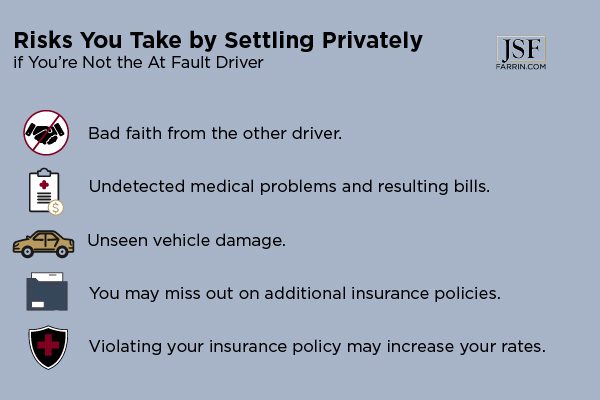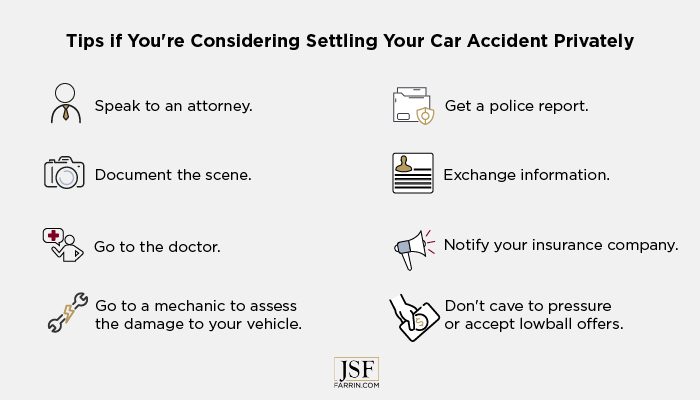Car accidents are disruptive, no matter how big or small. When you’re not at fault, it can be especially frustrating to deal with the insurance claims process, and you may be tempted to settle a minor car accident privately. Maybe you’re even friends with the person who hit you, and you want to help them avoid an insurance rate increase.
But what if what seems like a minor fender bender turns out to be a much bigger deal, requiring far more expense than what the at-fault driver is willing or able to pay? What if you feel pain in your neck or back later and it turns out to be a serious medical condition you can’t afford to treat? In these situations, if you’ve already agreed to a private settlement with the at-fault party, you might not have any options.
My advice is to seek the guidance of an attorney whenever you’ve been in a car accident before you agree to anything, even if you’re considering a private settlement.
Ask questions and trust that your attorney is concerned with helping you reach the best possible outcome for your situation. You may deserve fair and reasonable acknowledgement and award for the harm caused to you, and our job as attorneys is to try to make sure that takes place.
To get clarity on your case at no cost and with no obligation to hire us afterwards, call 1-866-900-7078 today or contact us online.
Why You Might Want to Settle Privately Even if You’re Not At-Fault
A private settlement might seem like a good option for three reasons:
- It’s a quick, easy, convenient way to get on with your life after a minor wreck that appears to have resulted in only some property damage.
- A private settlement can give you the opportunity to set the terms with more flexibility than if you went through the insurance claims process.
- You might be concerned that reporting the accident could make your insurance rates rise, even if you’re not at fault.
It’s true that a private settlement process can be simpler and more flexible than a formal claims process. However, as an experienced car accident attorney, I want to caution you against settling your accident privately unless:
- the damage is minor
- you’re certain there are no unseen damages to your vehicle
- you’re sure you’re not injured
Here’s an example of a situation in which you might be inclined to settle privately:
One day, you discover a small dent on the side of your parked car and then find a note on your windshield. The note is from the person who hit your car. It contains their contact info and a request for you to reach out to them so they can cover the damage. When you contact the person, they ask to settle privately to prevent their insurance rates from going up.
Before agreeing to anything, however, you take your car to a trusted mechanic who verifies that the damage is only superficial and does not extend beyond the dent itself. The mechanic then provides you with a quote for repairs that you can give to the person who hit your car.
At this point, you’re considering settling privately. But first, you contact a car accident attorney for a free case evaluation to try to ensure that you’re not setting yourself up for problems later by settling privately.
This is just a simple example, but your case might be more complicated or require additional consideration before you agree to settle privately. The following are some things to think about in general before you commit to a private car accident settlement.
Things to Consider Before Settling Your Car Accident Privately
The #1 tip is to consult with an experienced attorney before agreeing to anything.
Besides speaking to an attorney, some other tips to try to avoid problems from settling your car accident privately include:
- Get a police report – Call the police and speak to an officer about the accident to have them make an accident police report, even if you’re thinking of settling privately.
- Document the scene – Take pictures of the accident scene if you can and make detailed notes about exactly how the accident took place.
- Exchange information – Get the other driver’s insurance information to make it easier to file a claim, if that’s what you ultimately need to do.
- Go to the doctor – You may have suffered injuries you’re not yet aware of, as many injuries related to minor car accidents aren’t felt until days or weeks later. A doctor can help catch injuries early. Your records of care can also help build your case if you require damages for medical bills.
- Notify your insurance company – Your insurance company may require you to report accidents to them, even if they’re minor and you’re not at fault.
- Go to a mechanic to assess the damage to your vehicle – A mechanic will be able to tell you if there’s extensive damage to your car that isn’t obvious. They will also give you a quote for repairs that you can use to pursue compensation through a settlement, whether it’s private or through the insurance claims process.
- Don’t cave to pressure or accept lowball offers – The other driver may try to pressure you to accept less than what you know you should, but don’t let them. This is another area where a lawyer can help because an attorney can negotiate with the other driver or their insurance on your behalf.
Risks You Take by Settling Privately if You’re Not the At Fault Driver
Ideally, you’d be able to settle minor car accidents without anything to worry about. In reality, there are several risks you take by agreeing to settle privately without insurance and your attorney being involved.
Private settlement risks include:
Bad faith from the other driver
Whether you’re dealing with a close friend or total stranger, private settlements require you to trust the other driver to follow through on paying damages and taking responsibility for the accident. Someone who seems honest and enthusiastic about doing the right thing might change their mind or simply not do what they said they would, leaving you without alternatives to seek compensation.
Undetected medical problems and resulting bills
Note that it can be difficult to know if you’ve sustained an injury from a minor car accident because many car accident injuries, such as whiplash or a herniated disc, don’t always present symptoms right away.
It’s not uncommon for those who’ve been in car accidents to believe they did not sustain an injury, only to develop severe pain days or weeks later. If this happens and you’ve already accepted a private settlement, you might not be able to pay for the medical care you require or other damages that arise.
Unseen vehicle damage
Your car may look fine, but even a small impact can cause major disruptions to your vehicle, making it less safe, more likely to break down, and more expensive to fix than you might have realized.
Some examples of damage you might overlook after a minor fender bender include:
- Alignment problems
- Structural body damage
- Suspension deterioration
- Electrical and/or mechanical malfunction
Additional insurance policies you may miss out on
When you file a car accident claim, it’s possible that the at-fault driver has additional insurance policies beyond basic liability coverage that apply to the situation. In a case like that, following the claims process could lead to more compensation for you.
Violating your insurance policy and increasing your rates
Many car accident insurance policies require you to report even small car accidents that aren’t your fault. Failure to comply could result in increased rates and other penalties you’ll want to avoid.
Learn More: How to Find the Right Car Accident Lawyer for You
Beware! Once You Reach a Private Settlement, Your Case Is Over
Settlements usually involve a provision that states the injured party waives the right to come back for additional recovery for any additional damages or injuries. If a settlement has been signed and payment already sent for settlement, there is likely nothing that a lawyer can do to go back and retrieve anything additional for later discovered damages or injuries.
A lawyer can help you accurately value your case and injuries and weigh all of your options.
Free Case Evaluation From James Scott Farrin
Since 1997, the Law Offices of James Scott Farrin has helped recover more than $2 billion in total compensation for 73,000+ people. And counting.1
Our You-First Policy means we always act in your best interests. We will take your case only if we think we can get you a better result than you would get without us.
Contact us online or call 1-866-900-7078 today for a free case evaluation!







